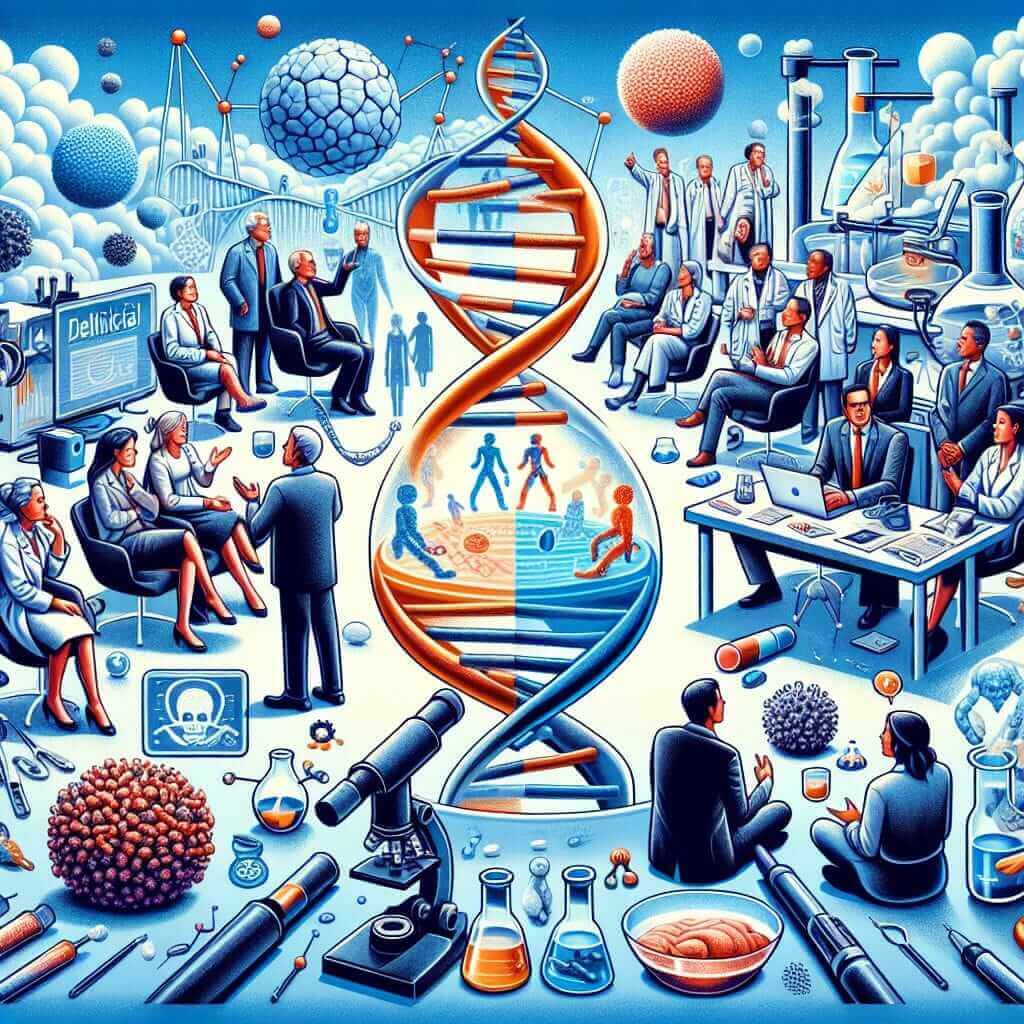The IELTS Reading section is one of the most challenging parts of the IELTS exam. It tests your ability to read quickly, understand complex texts, and extract key information. One of the frequently discussed topics in the Reading section is the “Social implications of biotechnology on ethics.” This topic explores the ethical concerns and societal impacts of advancements in biotechnology. Based on historical data and the prevalence of such topics in past IELTS exams, there is a high likelihood that this theme may appear in upcoming tests.
Reading Practice: Biotechnology and Ethics
Reading Passage
Title: Social Implications of Biotechnology on Ethics
Biotechnology, a rapidly evolving field, promises significant advancements in medicine, agriculture, and other domains. However, this progress also raises crucial ethical questions and societal concerns.
One of the primary ethical dilemmas revolves around genetic engineering. This technology allows for the precise modification of genes in organisms, including humans. While the potential benefits are immense—such as eradicating genetic diseases and improving agricultural yields—there are fears about the long-term effects. Could we inadvertently create new diseases or ecological imbalances? Moreover, the morality of ‘designing’ humans with desired traits is hotly contested.
Another aspect concerns genetically modified organisms (GMOs) in agriculture. GMOs can lead to food that is more nutritious and resistant to pests, reducing the need for harmful pesticides. However, ethical questions about the manipulation of life forms and potential health risks for consumers remain unresolved. Read more about the ethical implications of genetic engineering.
Cloning, another biotechnological advance, also poses ethical challenges. The cloning of animals for agricultural purposes or as pets has been met with both enthusiasm and concern. While cloned animals can be produced to have desirable traits, questions about animal welfare and the naturalness of such practices arise. Moreover, the idea of human cloning is largely rejected due to profound ethical and moral implications.
The socio-economic divide is another significant concern. Advanced biotechnological treatments and products are often expensive and inaccessible to the economically disadvantaged, leading to a widening gap between different socio-economic groups. This could result in unequal access to biotechnological benefits, further entrenching social inequalities.
In summary, while biotechnology promises many benefits, it also poses serious ethical and societal challenges. The debate over these issues is ongoing, and it is crucial for society to address these concerns responsibly.
Questions
Multiple Choice
-
What is one of the primary ethical concerns regarding genetic engineering?
- A. It may improve agricultural yields.
- B. It could create new diseases.
- C. It allows for the precise modification of genes.
- D. It makes food more nutritious.
-
Which benefit of GMOs is mentioned in the passage?
- A. They reduce the need for pesticides.
- B. They increase plant growth rates.
- C. They are cheaper to produce.
- D. They can cause health risks.
True/False/Not Given
-
Genetic engineering can eliminate all genetic diseases. (True/False/Not Given)
-
Most people support the idea of human cloning. (True/False/Not Given)
Matching Information
Match the reasons with their corresponding concerns:
-
Genetic Engineering
- i. Socio-economic divide
- ii. Cloning animals
- iii. Creating designer humans
-
GMOs
- i. Socio-economic divide
- ii. Cloning animals
- iii. Food resistance to pests
Summary Completion
Complete the summary with the correct word from the list:
The __ of animals has both positive outcomes and ethical challenges. While animals can exhibit desirable traits, concerns about their __ and the naturalness of these practices are significant.
(Cloning, Socio-economic divide, Welfare, Nutritious)
Answers
Multiple Choice
- B. It could create new diseases.
- A. They reduce the need for pesticides.
True/False/Not Given
- False
- False
Matching Information
- iii. Creating designer humans
- iii. Food resistance to pests
Summary Completion
The cloning of animals has both positive outcomes and ethical challenges. While animals can exhibit desirable traits, concerns about their welfare and the naturalness of these practices are significant.
Common Mistakes and How to Avoid Them
- Misinterpreting complex sentences: Break down sentences to understand the constituent parts.
- Overlooking key information: Practice skimming and scanning techniques to quickly locate essential details.
- Confusing similar-sounding options: Pay close attention to detail and always confirm your answers with evidence from the text.
Vocabulary Highlights
-
Genetic Engineering (noun) /ˈdʒɛnɛtɪk ˌɛnʤɪˈnɪərɪŋ/
- The deliberate modification of the characteristics of an organism by manipulating its genetic material.
-
Ethical (adj) /ˈɛθɪkəl/
- Relating to moral principles or the branch of knowledge dealing with these.
-
Cloning (noun) /ˈkloʊnɪŋ/
- The process of creating a genetically identical copy of an organism.
Grammar Focus
- Relative Clauses: Use relative clauses to provide additional information without starting a new sentence. For example:
- “Genetic engineering, which allows for precise modification, raises ethical concerns.”
- Conditional Sentences: Use conditional sentences to discuss potential scenarios and their consequences.
- “If biotechnological treatments remain expensive, the socio-economic divide will widen.”
Tips for a High Reading Score
- Practice Regularly: Consistent practice can help you understand different question types and develop quick reading skills.
- Improve Vocabulary: Enhancing your vocabulary, especially related to common IELTS topics, can help you understand texts better.
- Time Management: Learn to manage your time efficiently, allocating appropriate time to each section and question type.
- Analyze Mistakes: Review your mistakes and understand why you made them to avoid repeating them in the future.
For more detailed exploration, read our articles on the ethical implications of using genetic engineering and genetically modified organisms.

By following these tips and practicing with materials like the one provided, you can increase your chances of achieving a high score in the IELTS Reading section. Stay committed, and best of luck!